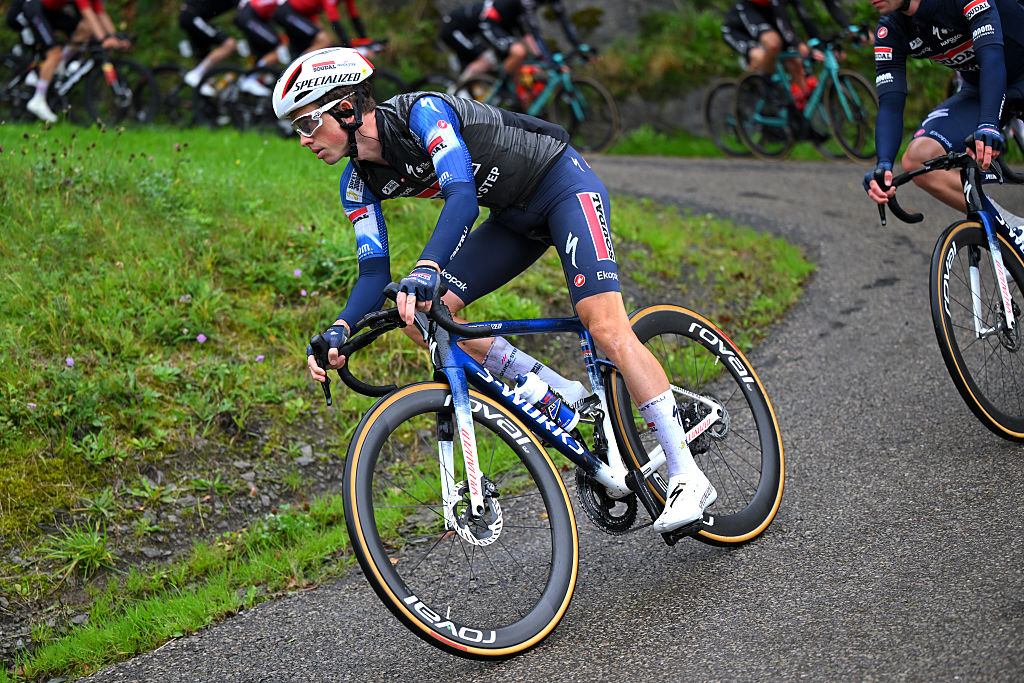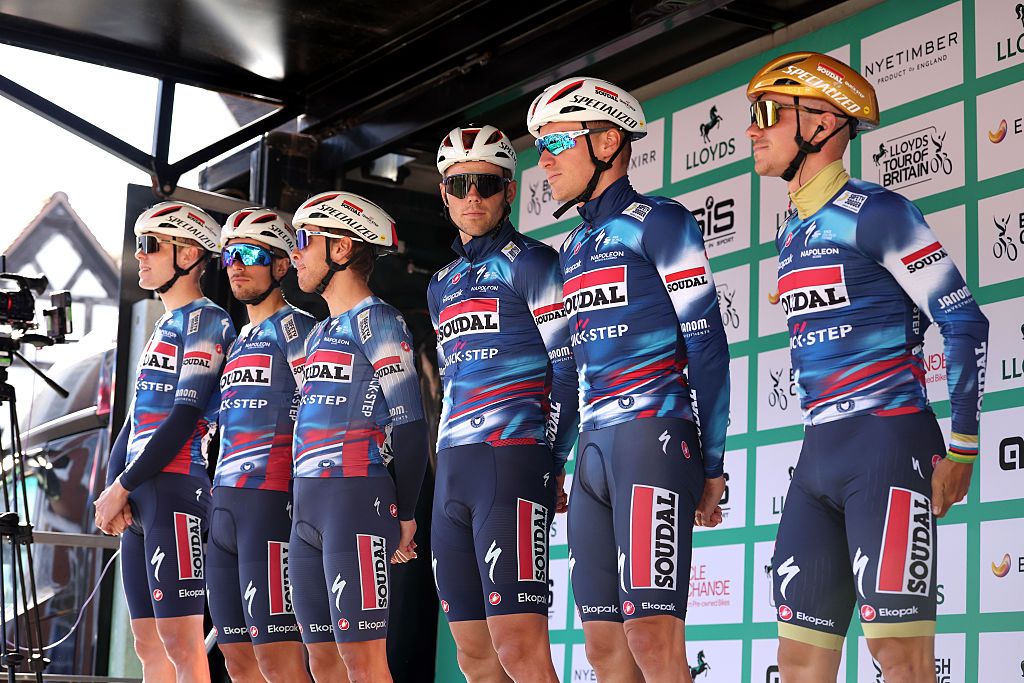This year’s cycling transfer market has been defined by a few big storylines, and one of those was Remco Evenepoel’s departure from Soudal-Quickstep to join Red Bull-Bora-Hansgrohe.
Over the summer, and even before then, a lot was made about where Evenepoel might go, what team could best fulfil his needs, and – once the deal was made – if and how Red Bull can help him achieve his ultimate goal of winning the Tour de France.
However, whilst a lot has been said about ‘Project Remco’ at Red Bull and the Belgian’s future, there is another side to this whole saga – the team that Evenepoel leaves behind at Soudal-Quickstep.
You may like
Whether that restrategising actually worked to its full extent is a question for another time – the fact that Evenepoel forced his way out early suggests it probably didn’t, in his eyes – but it has left the team in a strange position, a team built around one rider now without that rider.
Rebuilding their Classics core

Former Paris-Roubaix winner Dylan van Baarle will join Quickstep in 2026 (Image credit: Getty Images)
It’s clear what Soudal-Quickstep’s key strategy this transfer season was: to rebuild and reinforce their Classics core, and move back towards focusing on the races that used to be their foundation. This is a team that used to be utterly dominant in the spring, let’s not forget, and it was only the arrival of Evenepoel that pushed them more towards Grand Tour racing – it’s not what’s always been in their blood.
To this end, they have made some really big-name signings, picking up former Milan-San Remo and Omloop Het Nieuwsblad winner Jasper Stuyven – prying him away from Lidl-Trek after more than a decade – as well as 2022 Paris-Roubaix victor Dylan van Baarle.
These aren’t potential talents or riders knocking on the door of a win; they’re riders who have already won several big Classics, and have maybe slipped into a more support role at their former teams, but can likely win again if given leadership, which they will at the Belgian squads.
The only question mark over these two signings is that they’re in the latter part of their careers. The pair are both 33 years old, so have the team overlooked long-term investment in favour of some quick results? Perhaps, but Van Baarle is signed for two years, and Stuyven for three, so they’re not one-year retirement contracts, and I don’t think any party are expecting it to be a flash-in-the-pan situation.
You may like
However, the truth is that the team does need results straight away, so they had to go for reliable riders who can deliver, rather than riders who might be a year or two away from a big win.
GC options after Evenepoel

Filippo Zana will add some GC potential to the 2026 line-up (Image credit: Getty Images)
The biggest question facing Quickstep when the transfer market opened was how they might fill the gap left by Remco Evenepoel. The answer? Well, they haven’t, but that shouldn’t be a surprise. It was a pretty impossible gap to fill, and no riders on the market were capable of filling it.
Though they look to be pouring more focus into the Classics for next year, the team isn’t completely forgetting about stage racing, and they’ve recruited two key climbers in Filippo Zana and Steff Cras.
Whilst obviously not Grand Tour podium finishers, both Zana and Cras have threatened the top 10 of cycling’s biggest stage races, with the Italian finishing 11th at the 2024 Giro d’Italia and Cras taking the same result at the Vuelta a España two years ago.
They’re not terribly far off what would be a good Grand Tour result for a Classics-focused team, then. These are riders with innate talent and room to grow, so probably the best way the team could have spent their money.
We can’t forget, as well, that they have some existing riders who are ready to step more into GC roles. Mikel Landa may be 35, but he’s a Grand Tour podium finisher, and another good campaign isn’t out of the question. Valentin Paret-Peintre has also expressed how ready he is to take the opportunities that arise from Evenepoel’s departure, and he showed real promise this year.
On the younger side, the likes of Ilan Van Wilder, Junior Lecerf and Gianmarco Garofoli are also solid climbers and could develop into more rounded offerings.
Sprint reinforcements

What role will Alberto Dainese take in 2026? (Image credit: Getty Images)
Already boasting two of the most prolific sprinters in the world – Tim Merlier and Paul Magnier – Soudal-Quickstep didn’t have to get involved with the sprinters market, which has been a little fraught and complex this year. They have, however, brought in some reinforcements for the lead-outs, which should also help offer them solid support to both Merlier and Magnier.
From the Intermarché merger fallout, they’ve secured Laurenz Rex, a good signing – he’s not averse to going on the offensive and even winning himself, while he’s also been a super effective lead-out for Biniam Girmay for three years.
The team is also bringing in Alberto Dainese, and the proof of this one will be in the pudding. Dainese is a good rider, but QuickStep won’t afford that many spare sprint opportunities. Will he be happy to be their third-option sprinter, often racing as a lead-out instead, or will that frustrate him?
A desire for more leadership seemed to be the reason for the Italian’s move to Tudor, so it’s surprising to see him go to a team where he’ll be back down the pecking order. However, if he buys into the lead-out, occasional sprinter role, he’s strong enough that it could be good. Perhaps even having him race more pure sprints will allow Merlier more time to target the Classics.
Overall, though, Quickstep are pretty solid already when it comes to sprinters and lead-out trains, so they certainly haven’t done any harm to that arm with their signings, and so it should continue to be a fertile area for wins in 2026.
Development graduates

Jonathan Vervenne has already made his debut with the WorldTour squad, but steps up officially in January (Image credit: Getty Images)
Whilst a lot of teams with development arms seem to be promoting two or three riders this winter, Soudal-QuickStep are keeping it modest with one, and I think that’s a smart move.
The rider they’ve brought up is Jonathan Vervenne, a time trialist – currently under-23 European champion in that discipline – and workhorse who will bring some firepower to the team and continue his TT progress. As a Belgian, his arrival also fits in with the team’s desire to go back to their roots a little.
In the absence of Evenepoel, it may have been tempting to bring up more than one development rider as a cheap option. Instead, they’ve wisely chosen to focus the space they have on experienced, reliable riders. Vervenne should fit in well, and at 22 years of age, he’s a mature rider, but they’re not bogged down with young riders in a year in which they need to hit the ground running.
Losses

British climber James Knox is going to Picnic-PostNL next year (Image credit: Getty Images)
Soudal-QuickStep are saying goodbye to eight riders this year. One to retirement (Pieter Serry) and two to Red Bull (Evenepoel is taking Mattia Cattaneo with him), but among the other departures, there isn’t anyone who stands out as a rider they probably wanted to keep, but couldn’t.
Three of those riders don’t yet have a contract for 2026, so it’s only really James Knox and Luke Lamperti who have been picked up by other teams, but perhaps without Quickstep trying too hard to keep them.
Outside of Evenepoel, which is a blow for obvious reasons, the team isn’t really facing any serious losses. Serry and Cattaneo will be missed for their work rate, but Lamperti had probably reached a ceiling at QuickStep, and they have stronger sprinters and lead-outs to rely on – though he did reveal to Cyclingnews that they did try to renew his contract.
Knox does feel like a rider who could have still been useful, as he’s a very committed climbing domestique, but he doesn’t offer too much Classics value, so it makes sense to let him move on to Picnic-PostNL. It’s paradoxical, because Quickstep are probably facing the biggest gap of any team with Evenepoel leaving. They have been able to retain all the other riders they wanted, though.
The verdict
It’s clear that Soudal-QuickStep are going to feel the gap left by Remco Evenepoel, and with him, they do lose a serious Grand Tour contender that they haven’t been able to replace.
However, instead of rushing to try and find a – probably substandard – replacement GC rider, they’ve taken the change as an opportunity. It’s a chance for the team to choose their next direction, and they’ve clearly decided to move their focus back to the Classics, which was their bread and butter pre-Evenepoel.
With the budget freed up by his departure (and probably an injection of cash as part of his buy-out), they’ve been able to recruit really well, picking up some strong and established Classics riders. In the immediate future, this is more likely to pay off than bringing aboard a top 10 GC rider for the same cost.
We may not see Soudal-QuickStep on the podium of Grand Tours as much as we have in recent years, but the 2026 roster is strong and likely to earn them success in other areas.

